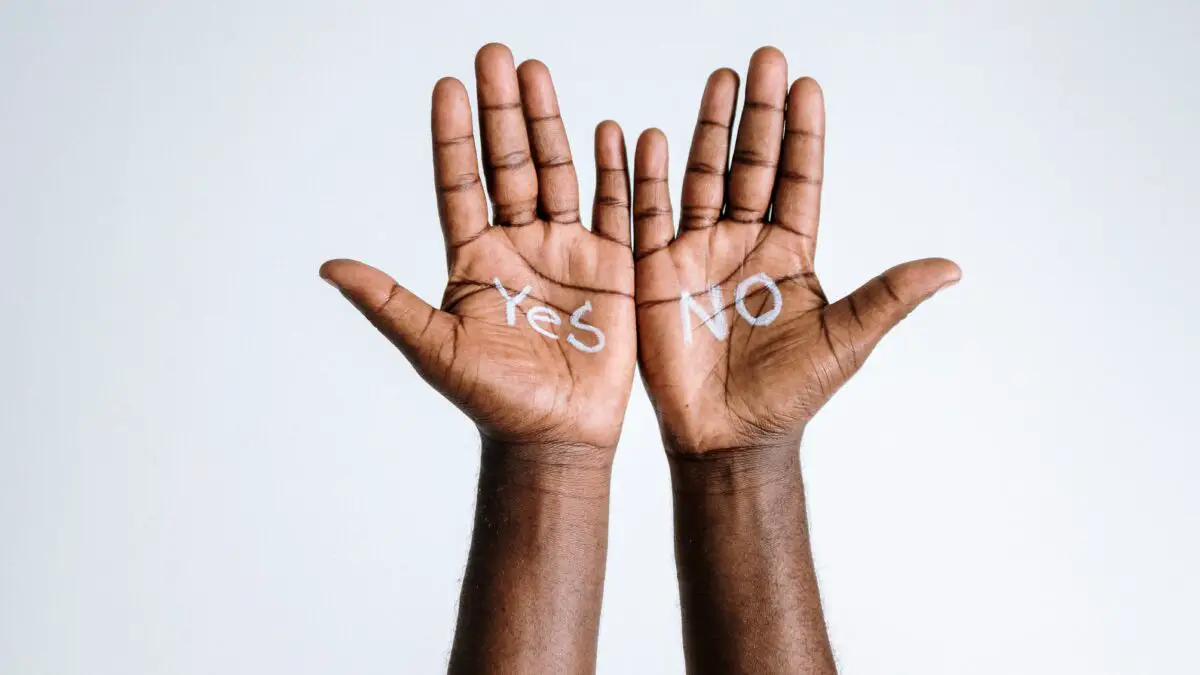Step into the captivating world of English idioms, where in this article choosing and decision idioms take center stage!
Our curated list of idioms about decision-making presents a fascinating array of expressions about making both right and wrong choices, revealing the challenges and emotions that accompany them.
From being caught between a rock and a hard place to standing at a crossroads, each idiom on the list comes with a definition and example sentence to help you understand how to use it.

Decision idioms
A fork in the road
Our list of decision idioms starts with a fork in the road. This is a point in life or a situation when you must make a significant choice that will lead you down one of two divergent paths, just like a road splitting into two directions.
“After finishing high school, I faced a fork in the road – either go to college or pursue my passion for traveling.”
A similar saying is standing at a crossroads, which is another name for a traffic junction where you can turn left or right or continue straight on. The main difference is that a fork presents only two options, whereas a crossroads has three or more.
We have more idioms about life and the path it takes in a separate article.
Spoilt for choice
When someone is spoilt for choice, it means they have an abundance of options to choose from. They may even find the decision-making process difficult due to the overwhelming number of possibilities.
“I went to the ice cream parlor, and they had so many flavors! I was spoilt for choice and it took me forever to pick just one.”
The ball is in your court
Not all of these idioms about choosing are about you making the choice yourself.
When someone says the ball is in your court, it means that the responsibility for making a decision or taking action lies with the person they are addressing. It’s a way of urging someone to make a choice or take the initiative.
“We’ve presented all the options, and now the ball is in your court.”
“We’re all waiting for Jane to announce a decision, but the ball has been in her court for over a week now.”
If you need more sport-related idioms we have some great examples.
Roll the dice
When you roll dice, the outcome is left to chance. So when someone decides to roll the dice on a choice they need to make, they are embracing uncertainty and venturing into a situation without knowing how it will turn out.
“After considering the pros and cons of starting his own business, John decided to roll the dice and invest his savings in the venture.”
Flip a coin
The second of our chance-dependent decision idioms is flip a coin. Like rolling dice, you leave the answer to chance or fate – with a 50% chance of each outcome occurring when you flip the coin.
“We couldn’t agree on where to go for dinner, so we decided to flip a coin to settle it.”
Note that whereas ‘roll the dice’ is generally used figuratively, ‘flip a coin’ usually means literally flipping a coin to decide between two options.
A variation of this decision idiom heard more in the UK is toss a coin.
Weigh up your options
With all of these idioms about choosing it’s important to carefully consider different choices before making a decision. You can weigh up your options by taking a thoughtful and deliberate approach to picking the best course of action.
“Before accepting the job offer, she spent days weighing up her options.”
In two minds
If you’re simply not sure what to do, you may be said to be in two minds. It’s another fun way of saying you are uncertain or indecisive about a choice, torn between two conflicting opinions or options.
“I’m in two minds about which car to buy – the practical one or the sporty one.”
The grass is/isn’t always greener on the other side
This one is more of a proverb about making decisions – read about the difference between proverbs and idioms here, if you’re not sure.
People often think others’ situations are better than their own. Telling someone that the grass is always greener on the other side warns against making decisions solely based on envy or the illusion that alternative options are superior. If you are always wanting what others have, you’ll never be satisfied with your own life.
“I had to take a break from social media as it just made me feel like the grass is always greener on the other side.”
You can also say the grass isn’t always greener on the other side to remind someone that things that seem desirable are not necessarily better than what you currently have.
“I thought changing jobs would solve all my problems, but the grass isn’t always greener on the other side – I miss my old colleagues and work environment.”
If you need more phrases to help encourage people in life, check out some positive idioms.
Have your pick
Here’s one of the easier decision idioms to understand. To have your pick simply means to have the freedom or privilege to choose from a variety of options.
You may also hear take your pick, meaning the same thing.
“At the bakery, you can have your pick from a wide selection of delicious pastries and cakes.”
“Kayt, you’re here first, so have your pick of the seats.”
“There are ham, cheese, egg, and salad sandwiches at the buffet. Take your pick!”
As you can see, this idiom may be used in the imperative form as well.
Stick to your guns
Once you have made your choice, you may not want to change your mind. If you do this you are sticking to your guns. This means remaining firm and resolute in a decision despite opposition or challenges.
“Even though others disagreed with my opinion, I decided to stick to my guns and defend my point of view during the meeting.”
Put your foot down
Just like sticking to your guns, when someone puts their foot down, it means they take a firm stance and make a decisive decision, often to assert authority or establish boundaries.
“After weeks of discussion, I had to put my foot down and make the final decision on the project’s direction.”
This can also be a driving idiom meaning to accelerate or drive faster.
Cast in stone
The last two idioms about choosing have been about not changing your mind, and here’s another.
When a decision is said to be cast in stone, it means it is fixed and cannot be changed or altered. Just like an inscription carved in stone, the decision becomes permanent and unyielding.
“Once the contract is signed, the terms are cast in stone, so make sure you agree with all the conditions before committing.”
Cut and dried
When a choice is cut and dried, it means it is already settled or predetermined, leaving no room for further discussion or debate.
“The rules for the competition were cut and dried, and there was no way to change them at the last minute.”
The term originally referred to herbs or plants that were cut and then dried for use, symbolizing a decision that is already fixed and settled.
Free will
This free idiom refers to the ability to make your own decisions in life; to think for yourself.
“You’ve been given the gift of free will, so use it wisely.”
In contrast to this would be the idea that someone else is controlling or influencing your decisions.

Idioms about choosing
Hobson’s choice
This phrase describes a situation where one is given only one option or choice, essentially having no real choice at all. It originates from a horse dealer named Thomas Hobson.
Hobson’s choice was to allow customers to choose any horse they wanted, as long as it was the one nearest to the stable door.
“The boss said we could either work overtime this weekend or lose our jobs – it’s a Hobson’s choice.”
Out of your hands
You can use this decision idiom to describe a situation where the outcome is decided by someone or something else. Out of your hands is another way of saying out of your control.
“Sorry I can’t tell you any more for now, the decision has been taken out of my hands.”
“I wish I could help but it’s out of my hands.”
Take the plunge
Just like a diver jumping off a diving board, when you take the plunge you make a decision that can’t be undone.
“After months of thinking about it, I decided to take the plunge and move to New York.”
This expression often describes a significant life choice that leads to new experiences, so it’s also a good idiom for adventure.
Behind closed doors
Some decisions have to be discussed secretly or privately before they are announced to others. A decision or discussion that happens in this way takes place behind closed doors, excluding other people from the process.
“The management team made the final decision behind closed doors, leaving the employees unaware of the changes until the announcement.”
Level-headed
It’s good to have someone level-headed making decisions for you. This means that they can stay rational and calm, even under pressure.
“I just don’t think Marcus is level-headed enough for this position.”
Interestingly, many head idioms relate to thinking and decision-making.
Separate the wheat/grain from the chaff
This saying appears on our list of choice idioms because it describes the process of distinguishing valuable, truthful information from the irrelevant or misleading.
Similar to separating the (edible) wheat/grain from the (undesirable) chaff, making a good decision involves identifying and focusing on what is true and relevant, and discarding everything else.
“Amidst the rumors and conflicting reports, our investigative team worked tirelessly to separate the wheat from the chaff and uncover the real scandal.”
You can find some more idioms about truth and lies here.
Between a rock and a hard place
Let’s continue this list with a few idioms about making a tough decision. If you find yourself in a situation faced with two equally difficult or unfavorable choices and no apparent easy way out, you are between a rock and a hard place.
This phrase conveys a feeling of being trapped or caught in a dilemma, akin to being stuck between two immovable objects.
“Jane found herself stuck between a rock and a hard place – she could either work overtime to complete the project on time or risk disappointing the client.”
We often use the word ‘stuck’ before this expression, as in the example above, to emphasize the difficulty of being in this position.
Wear the pants/trousers
In a relationship, sometimes one person has more influence in decision-making than the other. In this case, you could say the more controlling person wears the pants (US) or trousers (UK).
This relationship idiom is generally used to describe a woman who is controlling towards her husband or partner.
“Well, you can clearly see who wears the pants in that household!”
Bite the bullet
To bite the bullet is to make a difficult, tough, or unpleasant decision or face a challenging situation with courage and determination.
“After much consideration, I decided to bite the bullet and confront Zack about his behavior.”
Sadly, this phrase comes from the dated practice of giving soldiers a bullet to bite to distract from the pain during medical procedures.
Grin and bear it
When you endure or accept a difficult or unpleasant decision or situation with patience and fortitude, you grin and bear it. This is another way of saying ‘smile and put up with it’.
“Although I didn’t get the promotion, I decided to grin and bear it, and I’ll try again next year.”
Out of the frying pan, into the fire
This is a popular fire idiom about making bad decisions or having difficult choices. When you jump out of the frying pan, into the fire you escape a difficult or unpleasant situation but end up in an even worse predicament due to your hasty decision.
“I thought changing jobs would solve my problems, but it was a case of out of the frying pan, into the fire.”
Throw caution to the wind
Have you ever made a choice without considering the potential risks or consequences, acting with a bold and reckless approach?
When a person throws caution to the wind, they are willing to take daring actions or make decisions that others might perceive as impulsive or imprudent.
“Feeling the adrenaline rush, Sarah decided to throw caution to the wind and book a solo backpacking trip.”
Some people would say this is the wrong way to make decisions, but others enjoy a spontaneous approach!
There are plenty of other wind idioms in English, relating to many different topics.
On the fly
Sometimes you need idioms for last-minute decision making, and on the fly is the perfect fit! This expression relates to making a crucial decision at the last possible moment, often with little preparation or experience.
“With no time to consult anyone I just had to make a choice on the fly.”
Go with the flow
The last saying in our decision idioms list has to be to go with the flow.
This is a much more relaxed way of deciding what to do, allowing events or circumstances to guide your choices rather than making rigid plans or decisions. It encourages a more chilled-out and flexible approach to choosing, and adapting to the situation as it unfolds.
“I didn’t have a fixed itinerary for the trip; I decided to go with the flow and explore.”
This saying is a popular travel idiom for those who like to venture out without any rigid plans.
We hope you enjoyed this compilation of intriguing idioms about decision-making. From navigating through tough choices to encountering last-minute dilemmas, these decision idioms encapsulate the essence of human experience when faced with important choices.
Have you ever found yourself in a particularly tricky situation where one of these choice idioms perfectly described your predicament? We would love to hear your thoughts and experiences! Leave a comment below to share your stories or even suggest more idioms to add to this collection.
Until then, may your choices be wise and your decisions well-made!



